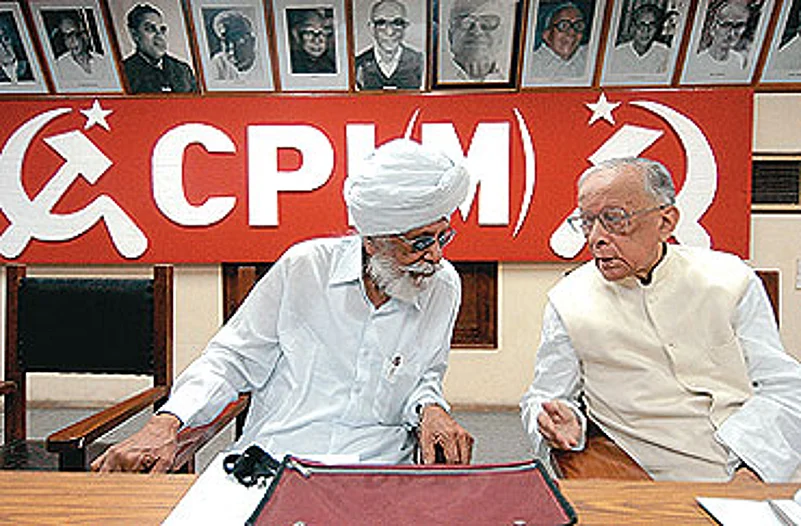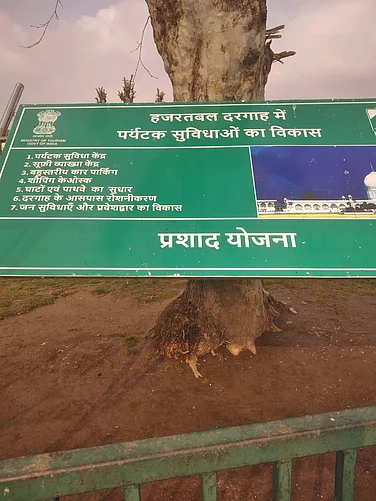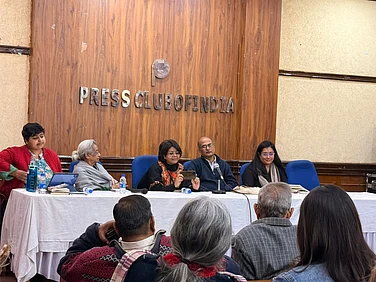- Has ensured UPA follows pro-poor agenda, slowed down their neo-liberalism
- Under him, the CPI(M) has won decisively in West Bengal, Kerala and Tripura
- Mobilised majority support in Parliament against the Indo-US nuclear deal
- Ever since he took over, the party membership has grown by 13 per cent.
- Accused of holding the UPA government to ransom on the nuclear deal
- Has failed to contain the fallout of Nandigarm
- Is known to be very rigid when dealing with friendly parties like the Congress
- Is still to resolve the bitter infighting in the Kerala unit of the CPI(M)
***

Karat's dilemma: A comparison with the old-timers doesn't factor in new realities
The jury is still out on whether the Achuthanandan-Pinarayi quarrel could have been sorted out before both were temporarily expelled from the CC. But party insiders explain the difficulties. "When you think of leaders like Jyoti Basu or Surjeet," says one, "you are looking at them after a lifetime of experience, experience that also gave them greater authority. In Kerala, both Achuthanandan and Pinarayi are mass leaders. Karat couldn't risk action against either as the section loyal to that leader might have walked out of the party. The ideological component of the battle between the two leaders is still being resolved."
On Nandigram, there's been a public admission of failure, with some Left leaders talking of the "arrogance of power". Left Front parties like the cpi, the Revolutionary Socialist Party and the Forward Bloc say it could have been averted had the CPI(M) heeded them. The earlier process of consultation, they say, has all but vanished. An rsp leader says, "After the Left Front's decisive 2006 win in Bengal, differences that were earlier sorted out in Front forums are now aired publicly. Smaller parties are ignored."
Besides, the party is grappling with how to push forward its industrialisation agenda without negating the gains it has made in the agrarian field. The death of senior CPI(M) leader Anil Biswas who "managed" the party and front in the state, and the shrinking role of Jyoti Basu have also added to the problems.
And at the centre? Says Srikant Jena, Union parliamentary affairs minister in the UF government, "Prakash has done well, carving out a distinct image for the CPI(M) while dealing with the UPA, far more than Surjeet was able to do when he was dealing with the UF. From the UF's point of view, Surjeet's role was positive; from the UPA's, Prakash's role has been difficult." But senior Left leaders call this a simplistic reading. They say that while the CPI(M) played a major role in the creation of the UF and Surjeet was "consulted" on major cabinet decisions, with the UPA, "it is not so". Also, in the Surjeet era, the new economic policy had not taken root, nor was such a major shift in foreign policy visible.
Has Karat's takeover then affected the CPI(M)'s style of "collective leadership"? Surjeet, of course, was more sociable peasant leader than revolutionary thinker and enjoyed an excellent rapport with the Congress and its coalition partners. By contrast, the quiet charm of the cerebral Karat is overshadowed by his hardline image.
Three years back, the Congress had hoped that the change in leadership would mean more a change of style than of substance. PMO sources had then id, "Dr Singh finds it easy dealing with Karat, whom he sees as straightforward. Karat never minces his words, the PM knows where he stands with him." But the fact is, new-age leaders like Karat are fundamentally more suspicious of the Congress than their seniors were. The Congress too faltered. Says a CPI(M) leader, "The UPA wasted two years thinking it could deal with us through a high-profile editor. The CPI(M) doesn't work through personal friendships."
So, as the party readies itself for its 19th party congress in Coimbatore (March 29 to April 3) to analyse why it is not growing outside its three bastions despite a 13 per cent growth in party membership in three years, it is working on a document on the contribution of the Indian Communists to the Marxist experience. "It is a unique experience," says CPI(M) MP Hannan Mollah. "Nowhere else in the world are Left governments working within an adverse system."


























